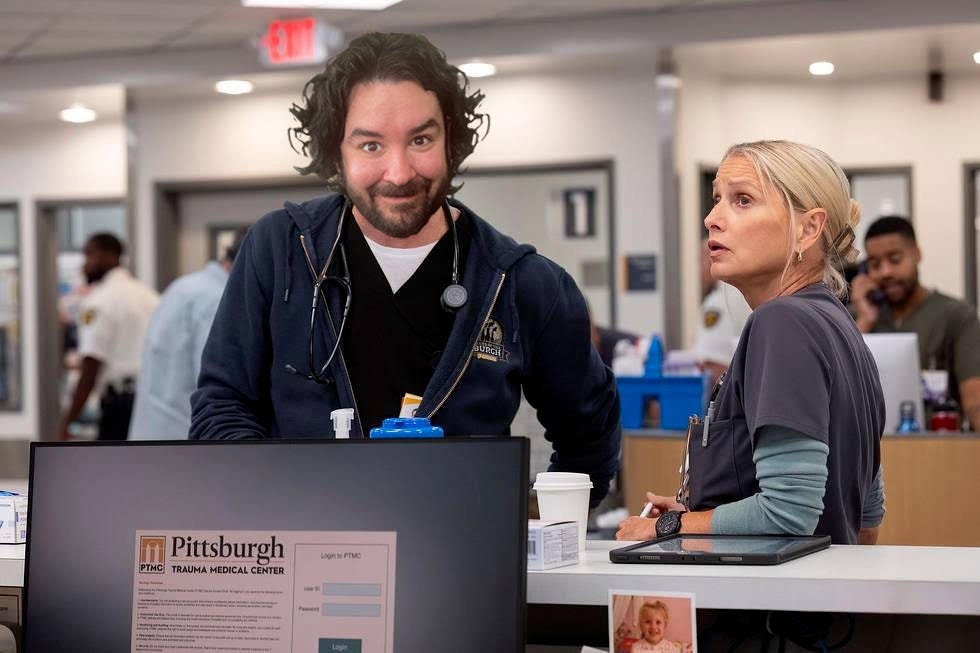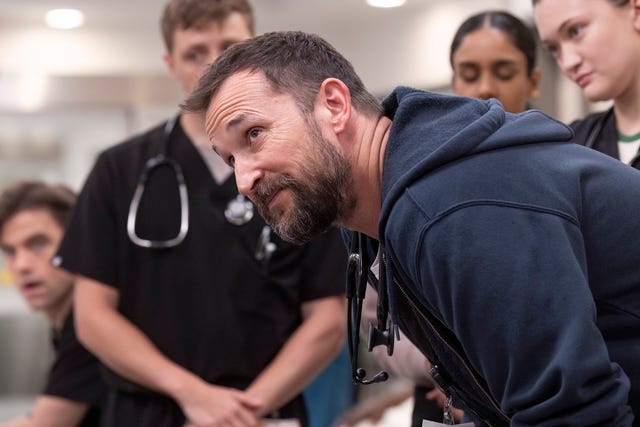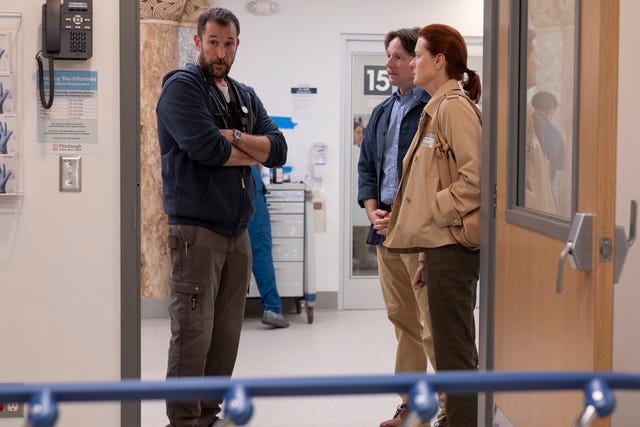
The joke is “I’m not a doctor, I just play one on TV,” but Noah Wyle is so convincing on The Pitt that I believe he could fake his way through an ER shift. Not as a doctor — even the most competent TV doctor couldn’t actually make those life-and-death decisions — but after all those years on ER and his new job producing, writing, and starring on The Pitt, the erstwhile John Carter could probably walk into an ER and acquit himself as a nurse assistant. He knows what the tools are, he definitely knows the jargon, and he could probably stay calm by pretending he’s just in another scene. He even talks like a doctor offscreen, and cares about the medical profession like a doctor would. I attended a press conference for The Pitt last week, and the moderator asked him if he learned anything about medical professionals that surprised him while making the show.
“I was shocked to find out that this was the first year that they didn't match all of the positions in emergency medicine, that we had been responsible for this huge spike in candidacy and an outpouring of money going into that discipline and some really excellent innovations happening over the last 30 years. And then that trend started to decline rapidly after Covid,” he said. “And I was shocked to see sort of what the need is out there and how bad it's gotten, what the boarding crisis is like, what the nursing shortages are like, in real terms when we talk to the experts.”
I include his full answer to show how he answered the question using medical jargon. “Match all of the positions” is a medical industry way of saying “Hire a doctor for every open role.” I also think he’s saying that ER helped inspire people to become ER doctors and push the field of emergency medicine forward, and part of why he’s making The Pitt is to try to inspire a new generation to enter the field, because there aren’t enough people doing it, and things are getting worse.
“I remember in 1994, ERs were the primary source of health care for most Americans,” he said. “22 million Americans didn't have health insurance. That was part of what went into our show's popularity, was how relevant it was at the time. And here we are 30 years later, talking about the exact same issues, except the problems have gotten a little bit worse. We are still playing catch up from the nuclear bomb that was dropped on the medical community in 2020. And it's going to take a while to right this ship. So part of doing this was to shine the spotlight back on this community and to hopefully inspire the next generation of healthcare workers to want to go into these jobs because we are going to need them. And our system is fragile. And it is as fragile as the quality of support we give our practitioners.”
It’s a noble goal, but TV doesn’t have the power to influence people like that anymore. The only way to inspire people to become doctors is through short-form social media videos that make it seem sexy and aspirational. A cute young doctor doing a “GRWM for my ER shift” video. But then the next video this potential doctor sees is a “person ranting in a car” video where someone who works in healthcare is complaining about how fucked the medical industry is, and that potential future doctor is preemptively disillusioned. They’ll pick a career where they can make more money in a less demanding way. In the future, the only jobs will be “influencer” or “crypto trader.”
But The Pitt does the thing that social media can’t do better than TV: it makes you care. The Pitt shows how ER doctors and nurses can make an immediate impact in people’s lives in a way that almost no other profession can, because they’re literally saving lives. They can help people through their most difficult moments. The Pitt’s recruitment pitch is that the job is meaningful. In a time when meaning is in short supply, hopefully that’s persuasive, for the sake of everyone who will have to go to an emergency room in the future.
The Pitt pushes its pro-doctor agenda through the strength of its craft. Everything on The Pitt – the writing, acting, editing, direction, production design, etc. – is done at an extraordinarily high level. There’s almost no music in the show, except when it’s there to so subtly enhance a scene that you barely even notice it. It’s a simple show, and characters can be defined in a single word — Isa Briones’ Dr. Santos is brash, Supriya Ganesh’s Dr. Mohan is empathetic, etc. — and everything they do challenges or reinforces their character. It’s classic, effective TV writing.
I marvel at The Pitt’s simplicity. I love the way the relentless pace of extremely high-stakes drama is naturally built into the show because it takes place in an emergency room. Every episode has about five moments that knock the wind out of me. Episode 4 has Wyle’s Dr. Robby teaching siblings who are about to take their father off life support to say “I love you, thank you, I forgive you, please forgive me,” and then the daughter telling the semi-comatose father all the things she wanted to say to him but couldn’t, and then Dr. Robby having flashbacks of watching his mentor die of Covid in the same hospital room, and then a girl who survived an accidental fentanyl overdose talking to the parents of her classmate who is not going to make it, and then a widower talking about how hard it is to raise a girl without a mother when he finds out his daughter has started menstruating. Relentless is the only word for it. It’s like standing on a beach and getting hit by wave after wave, except the water is drama. The show demands full attention, and it holds it.
I could see The Pitt becoming the first medical drama to earn Emmy nominations since House. Considering its popularity, its quality, and its similarity to past TV Academy favorite ER, I see no reason why the show can’t get nominations for drama series and best actor for Wyle if Warner Bros. mounts a campaign for it. It’s a good narrative to have a well-liked five-time nominee get his first nomination in 26 years for playing a character that’s similar to the one he’s known for. He won’t win — I think Severance is going to dominate this year — but he might snatch the sixth slot from Jake Gyllenhaal or Jeff Bridges. It would be cool to see.







Yeah, I have only seen the 1st 2 episodes but I like this show's naturalistic, almost documentary style--you noted the almost-total lack of music, which struck me as well, especially in comparison to ER (a show I loved for many years) and that pulsing, almost action-movie soundtrack it had. I think Noah Wyle is smart casting. You can almost see Dr. Robby as Dr. Carter, just 16 years further down the road.
I've been enjoying "The Pitt" on your recommendation. The show is entertaining and the writing is both believable and emotionally accurate. A teaching hospital ER is a complex and highly stratified organism. The levels of training such as 3rd year med student, ER residents (R1,R2,R3) and physician supervision from ER director to attending physician and consulting subspecialty physician are well represented and the dialogue is accurate.
Cognitive intelligence is a prerequisite for getting into med school. Emotional, social and spiritual intelligence are not. Proper specialty training can make a resident aware of the benefits of the each non-physician member of the clinical team. Patient care in the Pitt ER is enhanced by the Charge Nurse and Social Worker who serve as a conscience for physicians and students alike.
The ER support staff is what makes this ER drama for me. That and the focus on effective communication in end-of-life care. Another observation: the Institute for Doctor-Patient Communication at the Univ. of Pittsburgh Medical Center is a nationally recognized center of excellence.